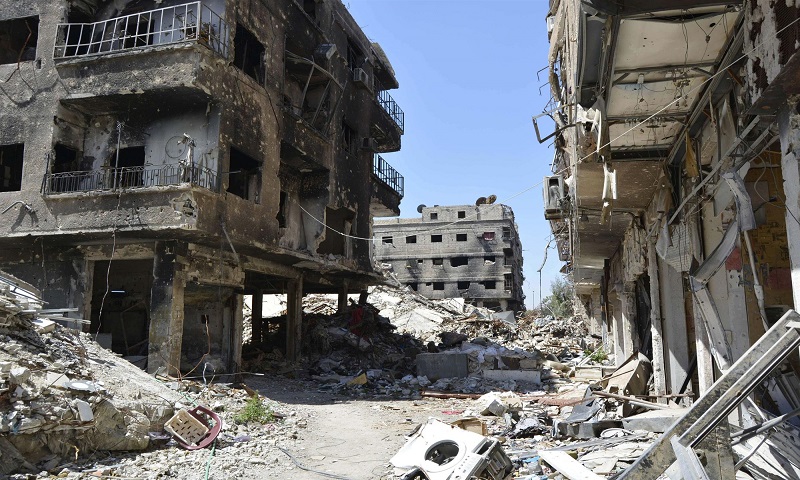



The Action Group for the Palestinians of Syria (AGPS) reported that bodies of Palestinian refugees were found under the rubble of destroyed houses in the Yarmouk camp south of Damascus, three years after the regime’s last military campaign on the camp.
On 21 April, the AGPS cited sources from the camp, saying that they have seen dozens of bodies under the debris of wrecked houses in several camp areas, particularly in the Yarmouk Street and al-Aurobah area.
Among the bodies identified by residents and named by the AGPS are: Mohammed Hadbeh, Haifa al-Haj, Enshirah al-Sha’bi, Basimah al-Ghoutani, Abdul Hadi al-Ghoutani, Salah al-Abiyat, Walid al-Wazir. These victims’ bodies remain buried under a building’s rubble in Atta al-Zir Street in the Yarmouk camp, according to the AGPS.
The victims’ relatives stressed that official authorities did not make any move to recover the bodies remaining in the debris.
The AGPS revived its demands to the Syrian regime government to allow civil defense and medical teams to work in the Yarmouk camp and retrieve the victims’ bodies from under the wreckage.
The Yarmouk camp witnessed battles between the factions of the former Free Syrian Army (FSA) and the Syrian regime forces, amid the division of the Palestinian factions between the two sides before the Islamic State (IS) took control of two-thirds of the camp in 2015.
In May 2018 and after a month-long military operation, during which IS was expelled from the camp, the regime’s forces completely re-established control over al-Hajar al-Aswad and the Yarmouk camp, in the wake of an unofficial evacuation agreement that transferred IS members to the desert areas of As-Suwayda.
The military clashes destroyed more than 60 percent of buildings and infrastructure in the Yarmouk camp, which was classified as the seventh most destroyed area in Syria, according to the “Syrian Cities Damage Atlas,” a report issued by the United Nations Institute for Training and Research (UNITAR) in cooperation with the REACH initiative.
The camp residents have complained repeatedly about the lack of essential services, the absence of adequate infrastructure, and the regime government’s negligence of streets and roads’ rehabilitation despite permitting residents to return to their homes.
Around 600 families of the camp’s displaced residents returned to their houses after Damascus governorate set three conditions permitting their return. The conditions included the structural safety of properties, the availability of ownership proof, and the ability to obtain necessary security permits.
Families currently living in the camp who are distributed in several neighborhoods such as al-Ja’ouna, Ain Ghazal, al-Taqadom, Haifa, Saba’ al-Siba’i, and Ihsan Kam al-Maz are experiencing great difficulties in securing their basic needs, including daily bread, drinkable water, and fuel for heating and cooking.
Residents of the camp cannot buy their essential necessities as the camp lacks shops and transportation means to help people reach other areas to secure their basic daily needs.
Today the Yarmouk camp lacks health, social, and service infrastructure. It has no hospitals, clinics, or pharmacies nor medical or health personnel.
if you think the article contain wrong information or you have additional details Send Correction